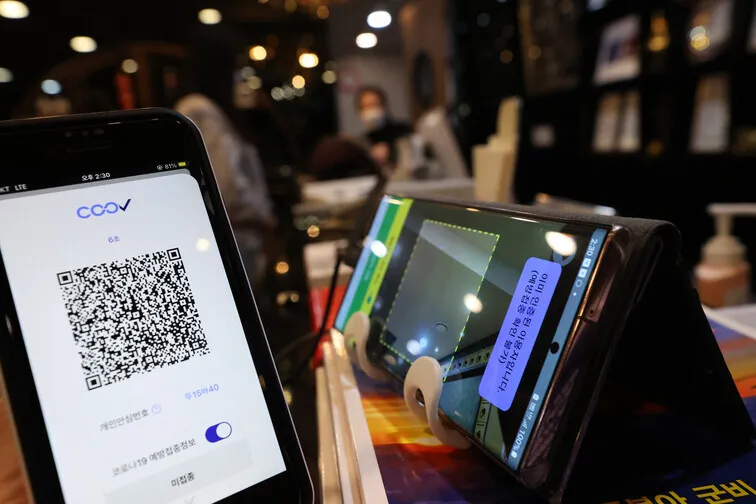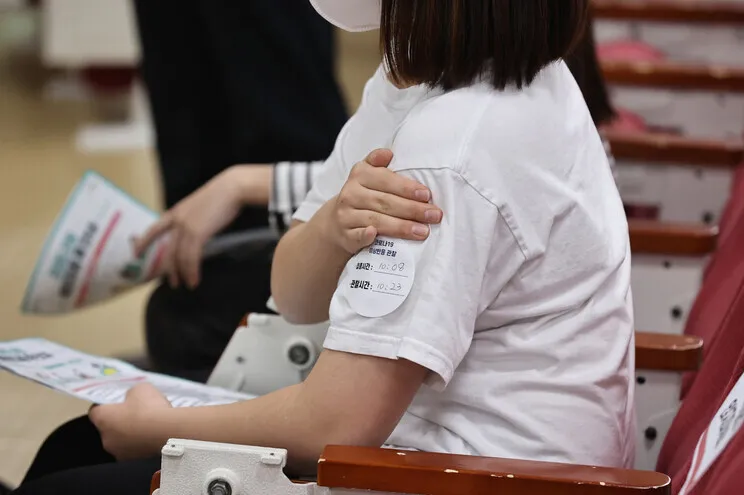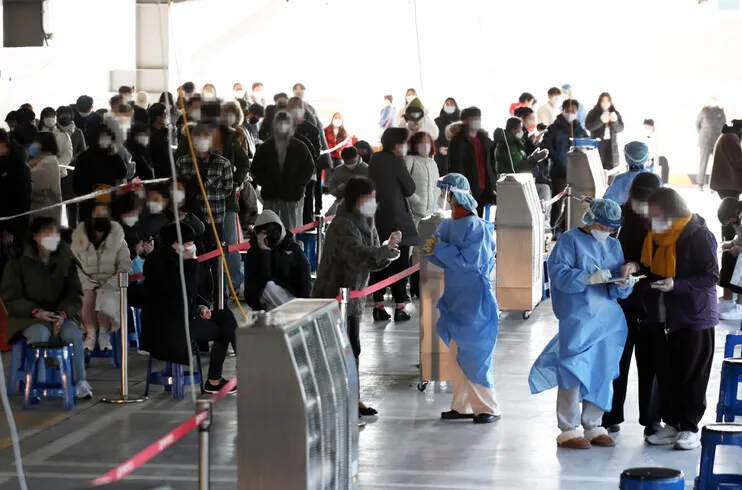hankyoreh
Links to other country sites 다른 나라 사이트 링크
“The benefits are evident”: S. Korean health authorities respond to vaccine pass backlash

Korea's vaccine passes officially have an expiration date as of Monday. While some citizens are criticizing the pass, calling it a “violation of basic rights” and going so far as to file a lawsuit, South Korean health authorities maintain that it is effective, arguing that the benefits to public health are evident.
Backlash to vaccine passesStarting Monday, the government instituted an expiration date to vaccine passes, restricting the use of multi-use facilities by people whose pass has expired. The pass is valid for 180 days, or 6 months, starting 14 days after an individual’s second dose of a COVID-19 vaccine. For those who received Johnson & Johnson’s single-dose Janssen vaccine, the same period goes into effect 14 days after being vaccinated.
Those whose pass has expired can extend the validity by getting a third jab. If an expired vaccine pass is read by a QR code reader, it will emit a bell sound, signaling that it has expired. The individual will then have to produce a negative PCR test taken within 48 hours in order to enter or use the facility. If a valid pass is held up to a QR reader then it will verbally confirm the valid vaccination status of the individual.
At a press briefing on Monday, Lee Sang-won, head of epidemiological investigation and analysis at Korea Disease Control and Prevention Agency (KDCA) said, “There may be some inconveniences, but [instituted an expiration date] is a necessary measure.”
“No disease control measures can be successful without public cooperation,” he added.
Even though over 90% of adults over 18 in South Korea have received their second dose of a COVID-19 vaccine, there has still been pushback among the unvaccinated regarding the vaccine pass system. Some see the pass as a violation of their rights.
On Dec. 31, a group of 1,023 people — made up of medical professionals, religious persons, and general civilians — including professor Cho Du-hyong of Yeungnam University’s College of Medicine, filed an administrative suit with the Seoul Administrative Court against the minister of health and welfare, the head of the KDCA, and the mayor of Seoul.
“By restricting unvaccinated people’s use of cafes, restaurants, private academies, and so on, the government is forcing people to get the vaccine, thus mass producing seriously ill patients and deaths,” Cho said, demanding that the government rescind its policies. The group also filed a formal request to have the pass system halted.

Medical authorities, however, are refuting these claims, saying the vaccine’s effectiveness at preventing infection and death from COVID-19 is medically and scientifically evident.
According to KDCA figures regarding COVID-19 vaccination and infection, the probability of someone becoming severely ill or dying within 28 days of contracting COVID-19 is only 0.28% among those who received three shots. This is 93.6% lower than the severity rate among cases of infection of unvaccinated individuals (4.37%).
On Monday, Son Young-rae, head of social strategy at the Central Disaster Management Headquarters said, “Currently, only 7% of adults over the age of 18 are unvaccinated, but they account for 30% of all confirmed cases and 53% of serious cases and fatalities.”
“Even in the comparative data per 100,000 population, unvaccinated people showed quintuple the rate of severity and quadruple the mortality rate of those who were fully vaccinated,” Son continued.
The fact that the unvaccinated, which account for only 7% of the total population, make up more than half of the severe and fatal cases, lend credence to the claim that vaccines are effective.
In addition, the government believes that introducing a validity period for vaccine passes is necessary for improving the current rate of booster shot vaccination. As of the end of the day Monday, 77.3% of the population over the age of 60 received a third vaccination dose, but the rate among those over the age of 18 is still only 41.9%.
Health authorities are emphasizing that the implementation of the vaccine pass can protect the healthcare system which treats both the unvaccinated and patients with other illnesses.
According to Son, “The vaccine pass is a measure to minimize the scale of transmission among unvaccinated and older people who are at higher risk of suffering severe symptoms if they contract COVID-19."
“There is no way to control the number of confirmed cases and stabilize the medical system without [social] distancing or the vaccine pass,” Son added.

Omicron might be riskier for Korea
The government temporarily halted the phased easing of restrictions on Dec. 18 and instead strengthened social distancing measures. The number of daily infections has since started to wane.
Moreover, Son does not agree that the Omicron variant may be less dangerous than Delta.
“Damage caused by COVID-19 needs to be evaluated not only by looking at the severity of the virus but also at the scale of the infection,” Son said.
“If we look at the situation leading up to the current point, the Omicron variant has been more dangerous and caused more harm than the Delta, in Korea, so the situation is concerning.”
By Lee Jae-ho, staff reporter
Please direct questions or comments to [english@hani.co.kr]

Editorial・opinion
![[Correspondent’s column] Coupang’s game in Washington follows familiar pattern [Correspondent’s column] Coupang’s game in Washington follows familiar pattern](https://flexible.img.hani.co.kr/flexible/normal/500/300/imgdb/original/2025/1226/8217667391873536.jpg) [Correspondent’s column] Coupang’s game in Washington follows familiar pattern
[Correspondent’s column] Coupang’s game in Washington follows familiar pattern![[Editorial] Coupang’s attempt to hide behind US won’t win back Korean consumers [Editorial] Coupang’s attempt to hide behind US won’t win back Korean consumers](https://flexible.img.hani.co.kr/flexible/normal/500/300/imgdb/original/2025/1226/1817667387971465.jpg) [Editorial] Coupang’s attempt to hide behind US won’t win back Korean consumers
[Editorial] Coupang’s attempt to hide behind US won’t win back Korean consumers- Coupang under fire for possible obstruction of investigation into its customer data leak
- [Editorial] Coupang founder’s contempt for workers, customer security knows no bounds
- [Column] Confessions of a Coupang-holic
- [Editorial] Kim Bom-suk’s arrogance on full display in boycott of Coupang leak hearing
- [Editorial] The facts of Yoon’s insurrection are clear — justice cannot be further delayed
- [Column] Trump destroys government
- [Column] A post-Western world approaches
- [Column] Offshore balancing, or carving out spheres of influence?
Most viewed articles
- 1Korea to trial next-gen train capable of sub-2-hour Seoul-Busan trip starting 2030
- 2Kim Jong-un’s hidden motive in criticizing South Korea’s nuclear submarine push
- 3[Editorial] Coupang’s attempt to hide behind US won’t win back Korean consumers
- 4Coupang under fire for possible obstruction of investigation into its customer data leak
- 5[Correspondent’s column] Coupang’s game in Washington follows familiar pattern
- 6Real-life heroes of “A Taxi Driver” pass away without having reunited
- 7Moon Jae-in renews call for end-of-war declaration, peace treaty on Korean Peninsula
- 8Chang Chun-ha’s family hopes to know truth of his death after 37 years
- 9Chinese money flooding into South Korean companies
- 10Russian architect personally witnessed Empress Myeongseong’s assassination by Japanese ronin, accoun